OORA200 Reflective Summary: Learning Experience, Weeks 1-5, Cumbria
VerifiedAdded on 2022/09/12
|10
|1524
|25
Journal and Reflective Writing
AI Summary
This assignment is a reflective summary of a student's learning experience in the OORA200 unit at the University of Cumbria, covering the first five weeks of the course. The student utilizes Gibbs' Reflective Cycle as a framework to analyze their learning journey, including descriptions of their experiences, reflections on their feelings and thoughts, and evaluations of both positive and negative aspects. The assignment delves into topics such as Aboriginal and non-Aboriginal interactions in Australia, cultural awareness, and the importance of empathy in nursing practices. The student discusses their initial lack of knowledge about Aboriginal culture and their evolving understanding through the course, including the impact of historical events like the 'stolen generation'. The reflection includes an analysis of the value of spirituality, and the development of patience, and concludes with an action plan for applying the acquired knowledge to their future profession as a registered nurse. The summary references several academic sources to support their reflections and provide context to their learning.
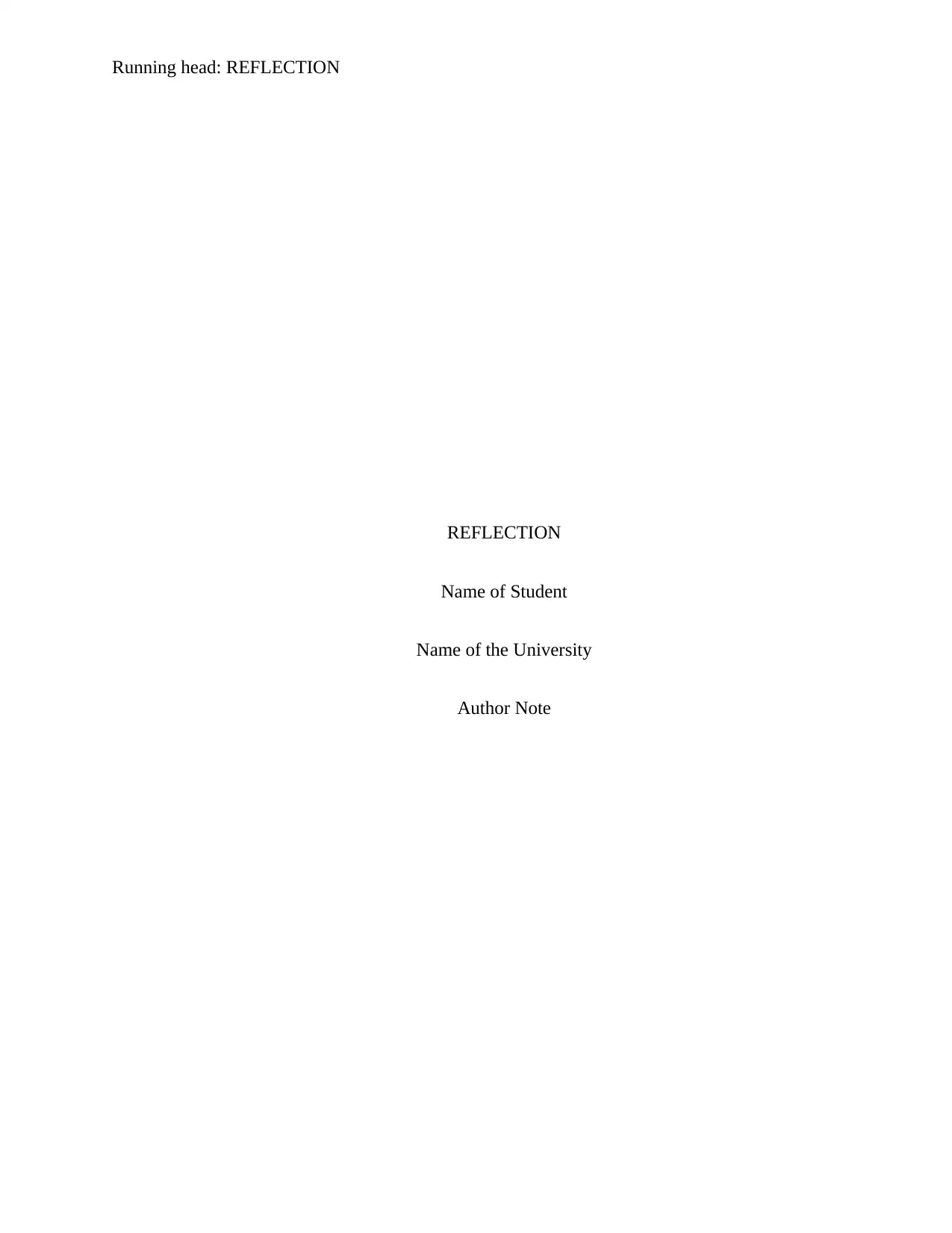
Running head: REFLECTION
REFLECTION
Name of Student
Name of the University
Author Note
REFLECTION
Name of Student
Name of the University
Author Note
Paraphrase This Document
Need a fresh take? Get an instant paraphrase of this document with our AI Paraphraser
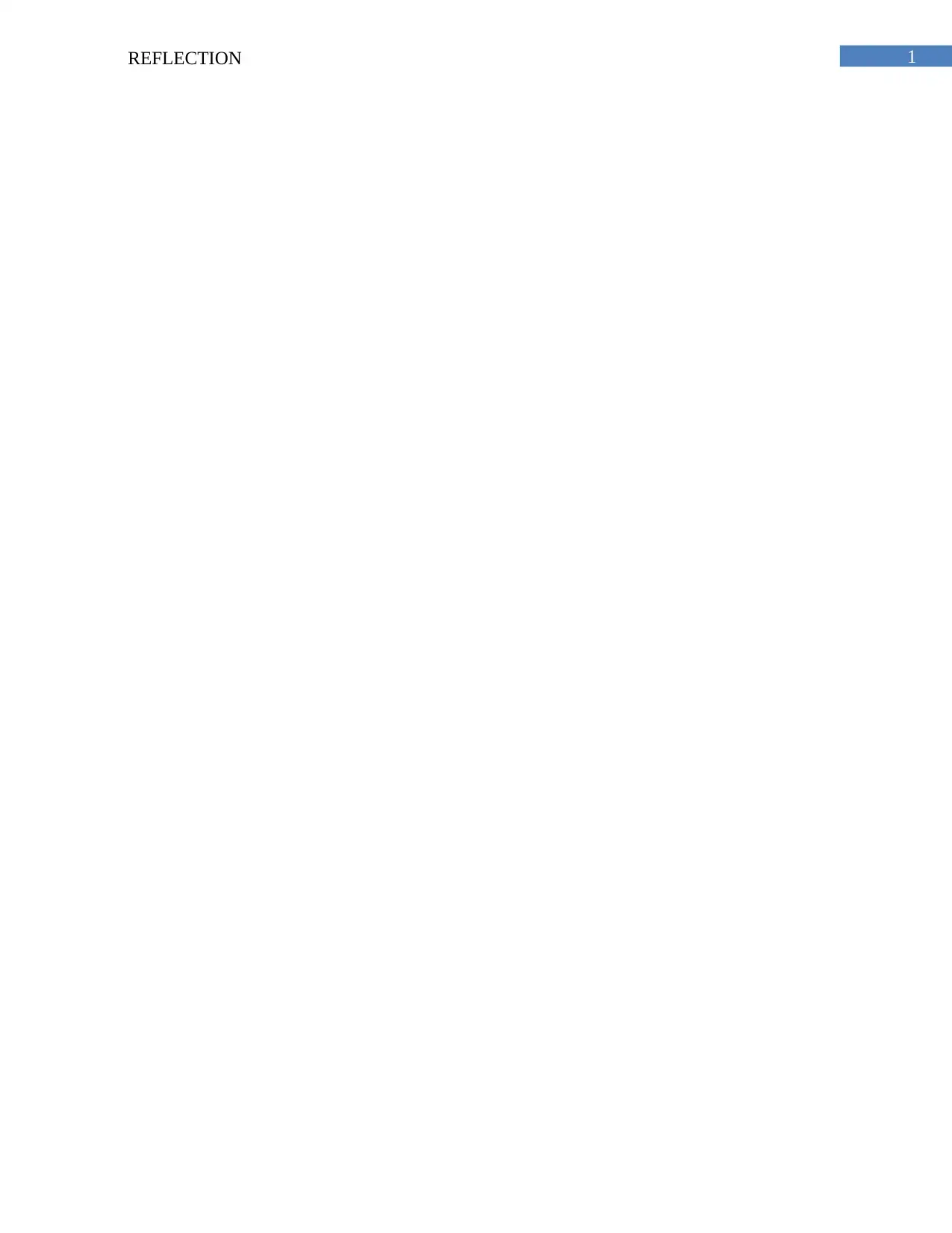
1REFLECTION
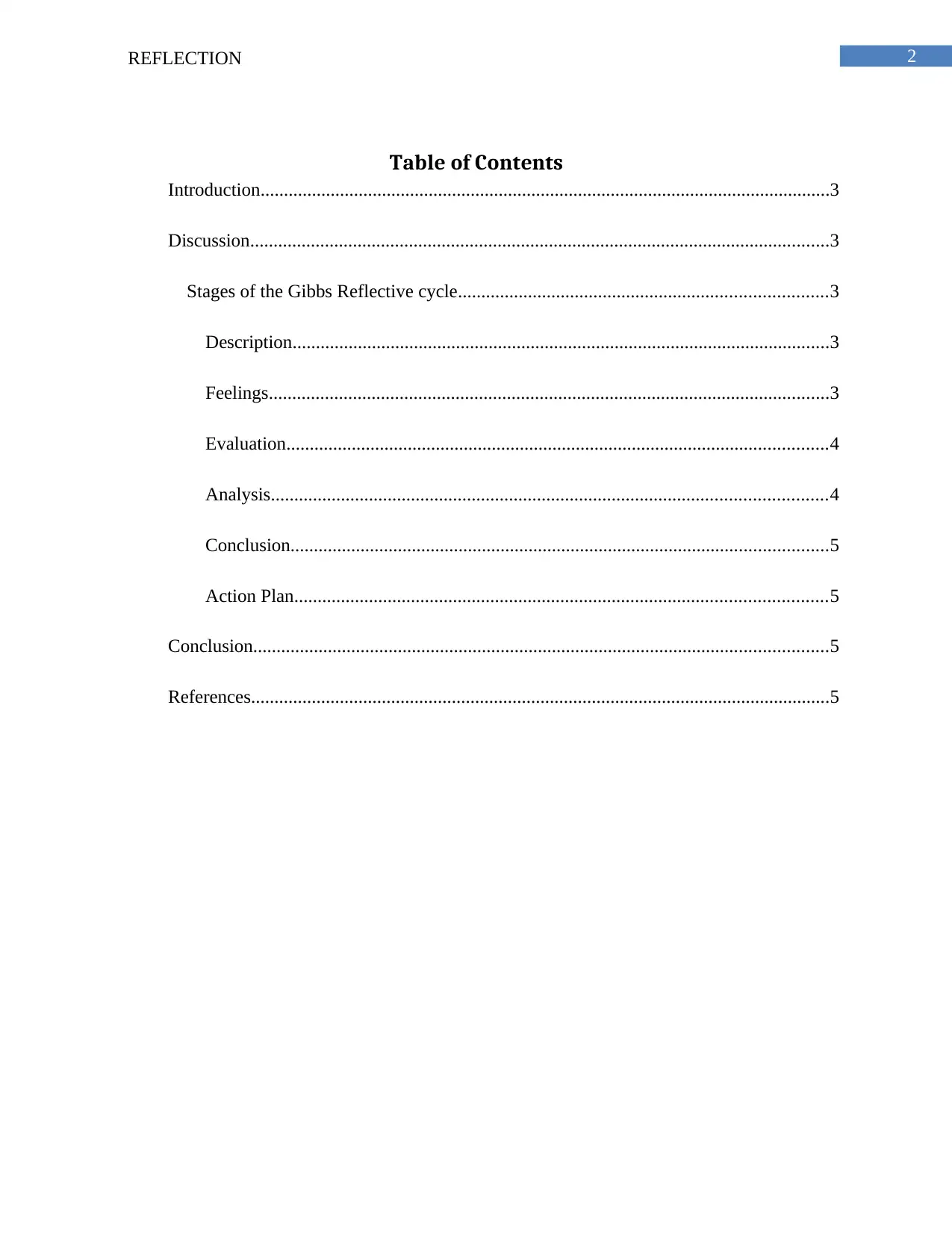
2REFLECTION
Table of Contents
Introduction..........................................................................................................................3
Discussion............................................................................................................................3
Stages of the Gibbs Reflective cycle...............................................................................3
Description...................................................................................................................3
Feelings........................................................................................................................3
Evaluation....................................................................................................................4
Analysis.......................................................................................................................4
Conclusion...................................................................................................................5
Action Plan..................................................................................................................5
Conclusion...........................................................................................................................5
References............................................................................................................................5
Table of Contents
Introduction..........................................................................................................................3
Discussion............................................................................................................................3
Stages of the Gibbs Reflective cycle...............................................................................3
Description...................................................................................................................3
Feelings........................................................................................................................3
Evaluation....................................................................................................................4
Analysis.......................................................................................................................4
Conclusion...................................................................................................................5
Action Plan..................................................................................................................5
Conclusion...........................................................................................................................5
References............................................................................................................................5
⊘ This is a preview!⊘
Do you want full access?
Subscribe today to unlock all pages.

Trusted by 1+ million students worldwide
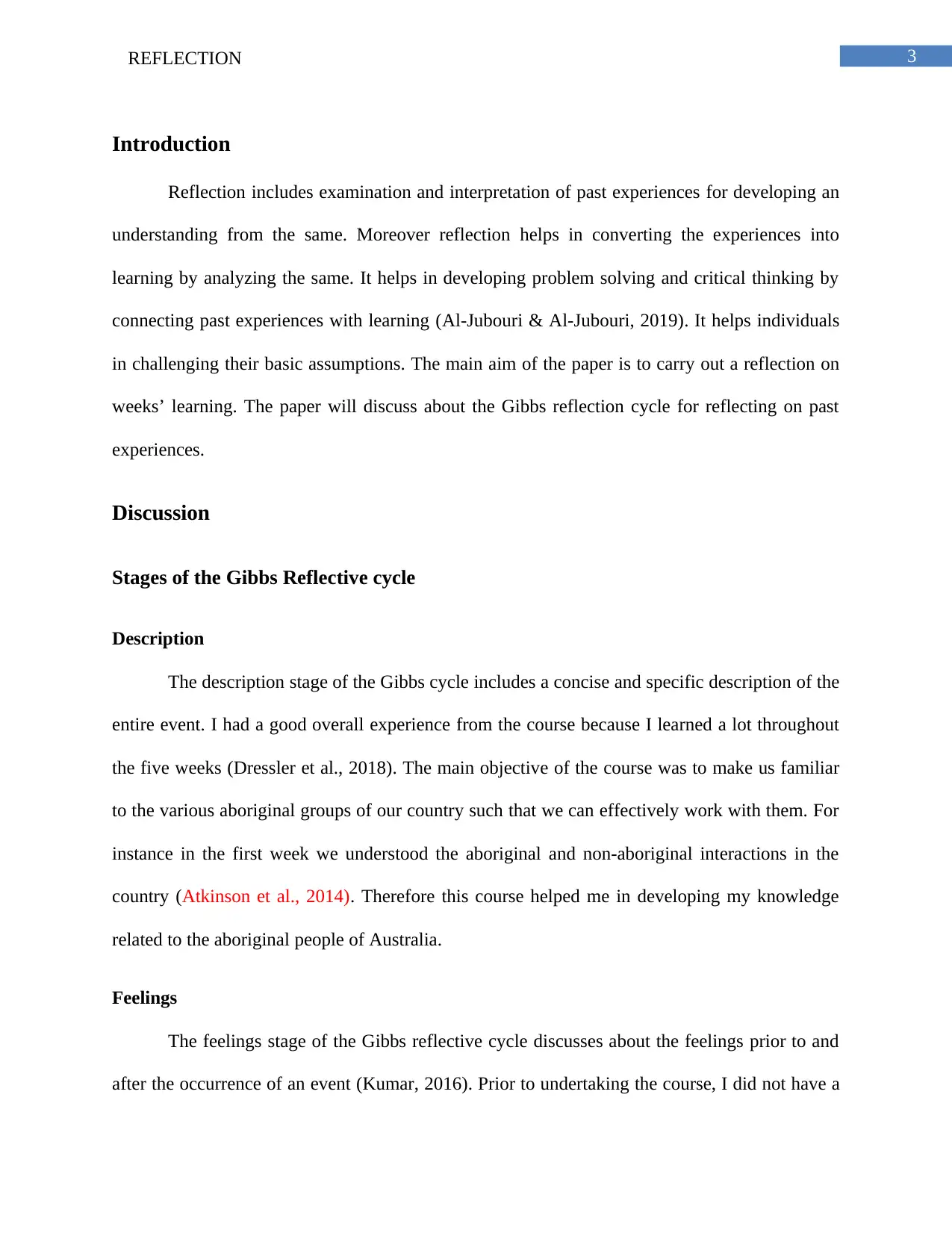
3REFLECTION
Introduction
Reflection includes examination and interpretation of past experiences for developing an
understanding from the same. Moreover reflection helps in converting the experiences into
learning by analyzing the same. It helps in developing problem solving and critical thinking by
connecting past experiences with learning (Al-Jubouri & Al-Jubouri, 2019). It helps individuals
in challenging their basic assumptions. The main aim of the paper is to carry out a reflection on
weeks’ learning. The paper will discuss about the Gibbs reflection cycle for reflecting on past
experiences.
Discussion
Stages of the Gibbs Reflective cycle
Description
The description stage of the Gibbs cycle includes a concise and specific description of the
entire event. I had a good overall experience from the course because I learned a lot throughout
the five weeks (Dressler et al., 2018). The main objective of the course was to make us familiar
to the various aboriginal groups of our country such that we can effectively work with them. For
instance in the first week we understood the aboriginal and non-aboriginal interactions in the
country (Atkinson et al., 2014). Therefore this course helped me in developing my knowledge
related to the aboriginal people of Australia.
Feelings
The feelings stage of the Gibbs reflective cycle discusses about the feelings prior to and
after the occurrence of an event (Kumar, 2016). Prior to undertaking the course, I did not have a
Introduction
Reflection includes examination and interpretation of past experiences for developing an
understanding from the same. Moreover reflection helps in converting the experiences into
learning by analyzing the same. It helps in developing problem solving and critical thinking by
connecting past experiences with learning (Al-Jubouri & Al-Jubouri, 2019). It helps individuals
in challenging their basic assumptions. The main aim of the paper is to carry out a reflection on
weeks’ learning. The paper will discuss about the Gibbs reflection cycle for reflecting on past
experiences.
Discussion
Stages of the Gibbs Reflective cycle
Description
The description stage of the Gibbs cycle includes a concise and specific description of the
entire event. I had a good overall experience from the course because I learned a lot throughout
the five weeks (Dressler et al., 2018). The main objective of the course was to make us familiar
to the various aboriginal groups of our country such that we can effectively work with them. For
instance in the first week we understood the aboriginal and non-aboriginal interactions in the
country (Atkinson et al., 2014). Therefore this course helped me in developing my knowledge
related to the aboriginal people of Australia.
Feelings
The feelings stage of the Gibbs reflective cycle discusses about the feelings prior to and
after the occurrence of an event (Kumar, 2016). Prior to undertaking the course, I did not have a
Paraphrase This Document
Need a fresh take? Get an instant paraphrase of this document with our AI Paraphraser
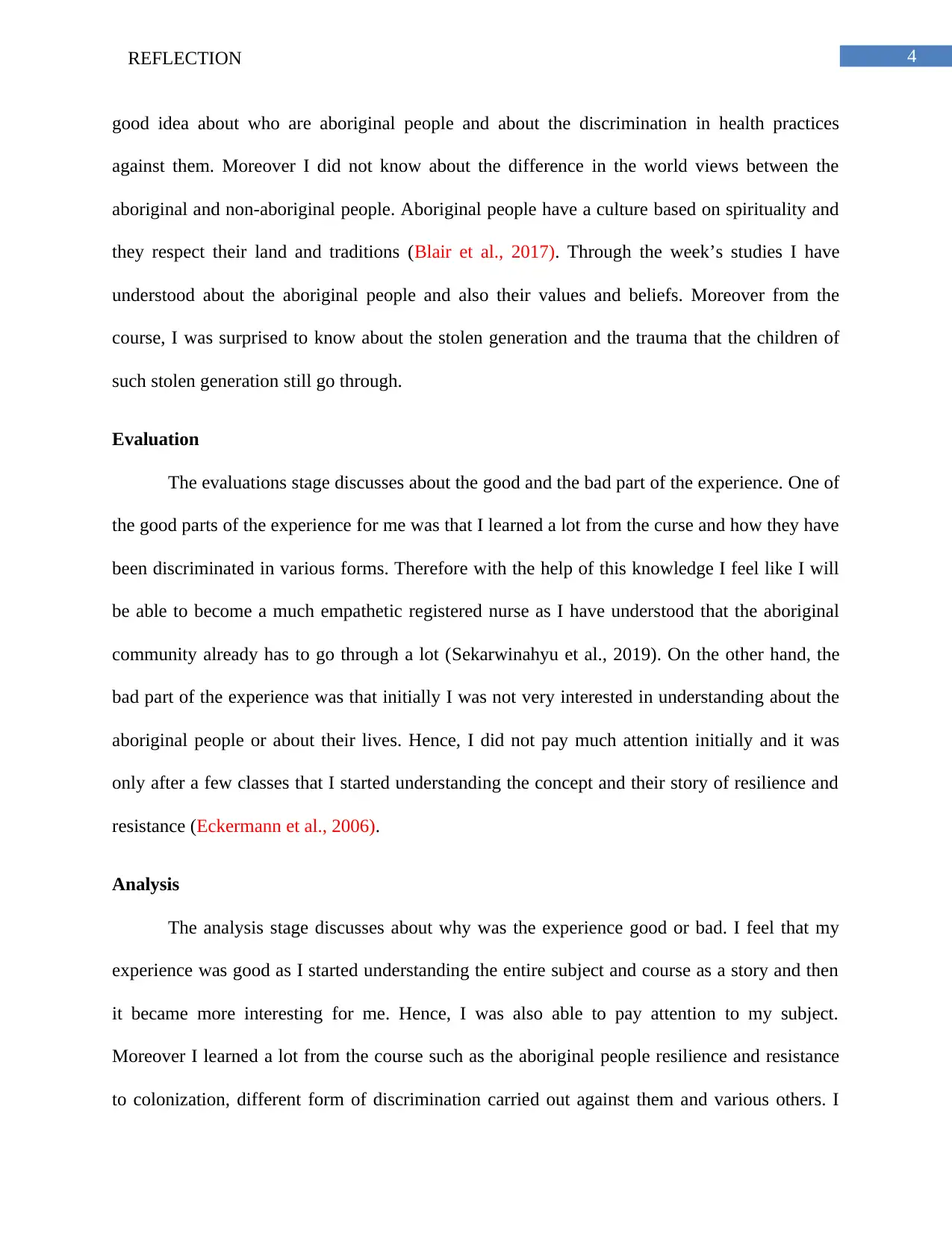
4REFLECTION
good idea about who are aboriginal people and about the discrimination in health practices
against them. Moreover I did not know about the difference in the world views between the
aboriginal and non-aboriginal people. Aboriginal people have a culture based on spirituality and
they respect their land and traditions (Blair et al., 2017). Through the week’s studies I have
understood about the aboriginal people and also their values and beliefs. Moreover from the
course, I was surprised to know about the stolen generation and the trauma that the children of
such stolen generation still go through.
Evaluation
The evaluations stage discusses about the good and the bad part of the experience. One of
the good parts of the experience for me was that I learned a lot from the curse and how they have
been discriminated in various forms. Therefore with the help of this knowledge I feel like I will
be able to become a much empathetic registered nurse as I have understood that the aboriginal
community already has to go through a lot (Sekarwinahyu et al., 2019). On the other hand, the
bad part of the experience was that initially I was not very interested in understanding about the
aboriginal people or about their lives. Hence, I did not pay much attention initially and it was
only after a few classes that I started understanding the concept and their story of resilience and
resistance (Eckermann et al., 2006).
Analysis
The analysis stage discusses about why was the experience good or bad. I feel that my
experience was good as I started understanding the entire subject and course as a story and then
it became more interesting for me. Hence, I was also able to pay attention to my subject.
Moreover I learned a lot from the course such as the aboriginal people resilience and resistance
to colonization, different form of discrimination carried out against them and various others. I
good idea about who are aboriginal people and about the discrimination in health practices
against them. Moreover I did not know about the difference in the world views between the
aboriginal and non-aboriginal people. Aboriginal people have a culture based on spirituality and
they respect their land and traditions (Blair et al., 2017). Through the week’s studies I have
understood about the aboriginal people and also their values and beliefs. Moreover from the
course, I was surprised to know about the stolen generation and the trauma that the children of
such stolen generation still go through.
Evaluation
The evaluations stage discusses about the good and the bad part of the experience. One of
the good parts of the experience for me was that I learned a lot from the curse and how they have
been discriminated in various forms. Therefore with the help of this knowledge I feel like I will
be able to become a much empathetic registered nurse as I have understood that the aboriginal
community already has to go through a lot (Sekarwinahyu et al., 2019). On the other hand, the
bad part of the experience was that initially I was not very interested in understanding about the
aboriginal people or about their lives. Hence, I did not pay much attention initially and it was
only after a few classes that I started understanding the concept and their story of resilience and
resistance (Eckermann et al., 2006).
Analysis
The analysis stage discusses about why was the experience good or bad. I feel that my
experience was good as I started understanding the entire subject and course as a story and then
it became more interesting for me. Hence, I was also able to pay attention to my subject.
Moreover I learned a lot from the course such as the aboriginal people resilience and resistance
to colonization, different form of discrimination carried out against them and various others. I
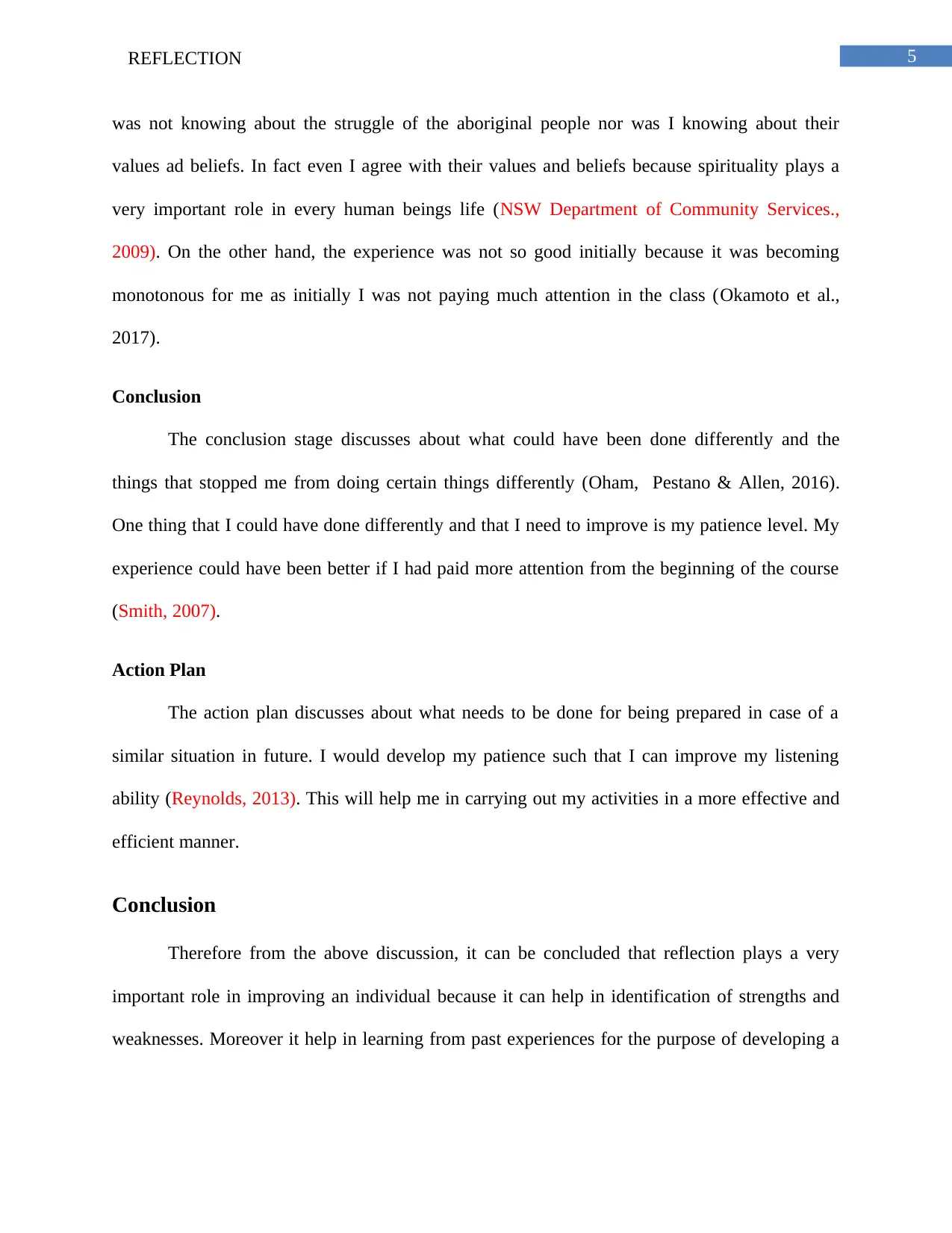
5REFLECTION
was not knowing about the struggle of the aboriginal people nor was I knowing about their
values ad beliefs. In fact even I agree with their values and beliefs because spirituality plays a
very important role in every human beings life (NSW Department of Community Services.,
2009). On the other hand, the experience was not so good initially because it was becoming
monotonous for me as initially I was not paying much attention in the class (Okamoto et al.,
2017).
Conclusion
The conclusion stage discusses about what could have been done differently and the
things that stopped me from doing certain things differently (Oham, Pestano & Allen, 2016).
One thing that I could have done differently and that I need to improve is my patience level. My
experience could have been better if I had paid more attention from the beginning of the course
(Smith, 2007).
Action Plan
The action plan discusses about what needs to be done for being prepared in case of a
similar situation in future. I would develop my patience such that I can improve my listening
ability (Reynolds, 2013). This will help me in carrying out my activities in a more effective and
efficient manner.
Conclusion
Therefore from the above discussion, it can be concluded that reflection plays a very
important role in improving an individual because it can help in identification of strengths and
weaknesses. Moreover it help in learning from past experiences for the purpose of developing a
was not knowing about the struggle of the aboriginal people nor was I knowing about their
values ad beliefs. In fact even I agree with their values and beliefs because spirituality plays a
very important role in every human beings life (NSW Department of Community Services.,
2009). On the other hand, the experience was not so good initially because it was becoming
monotonous for me as initially I was not paying much attention in the class (Okamoto et al.,
2017).
Conclusion
The conclusion stage discusses about what could have been done differently and the
things that stopped me from doing certain things differently (Oham, Pestano & Allen, 2016).
One thing that I could have done differently and that I need to improve is my patience level. My
experience could have been better if I had paid more attention from the beginning of the course
(Smith, 2007).
Action Plan
The action plan discusses about what needs to be done for being prepared in case of a
similar situation in future. I would develop my patience such that I can improve my listening
ability (Reynolds, 2013). This will help me in carrying out my activities in a more effective and
efficient manner.
Conclusion
Therefore from the above discussion, it can be concluded that reflection plays a very
important role in improving an individual because it can help in identification of strengths and
weaknesses. Moreover it help in learning from past experiences for the purpose of developing a
⊘ This is a preview!⊘
Do you want full access?
Subscribe today to unlock all pages.

Trusted by 1+ million students worldwide
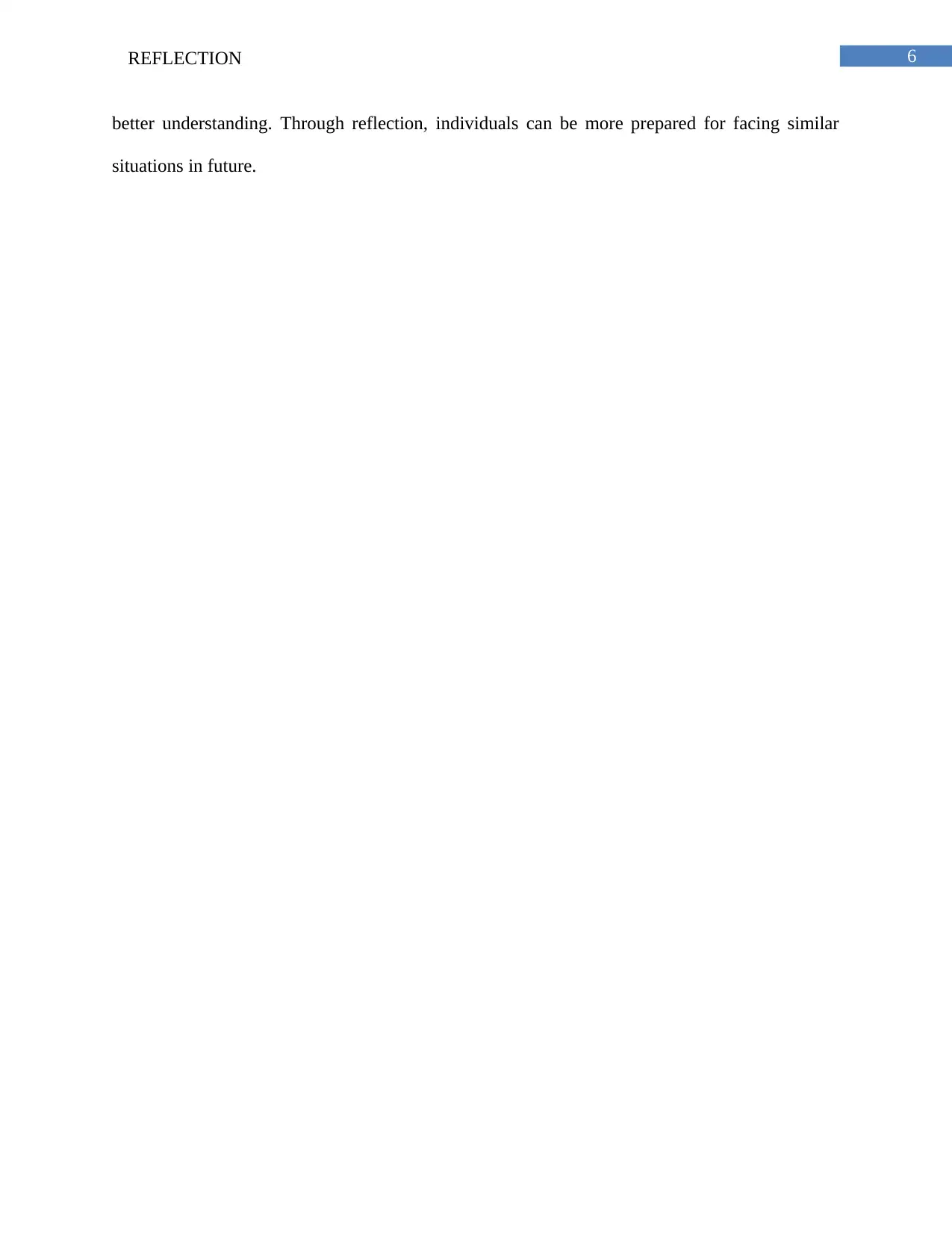
6REFLECTION
better understanding. Through reflection, individuals can be more prepared for facing similar
situations in future.
better understanding. Through reflection, individuals can be more prepared for facing similar
situations in future.
Paraphrase This Document
Need a fresh take? Get an instant paraphrase of this document with our AI Paraphraser
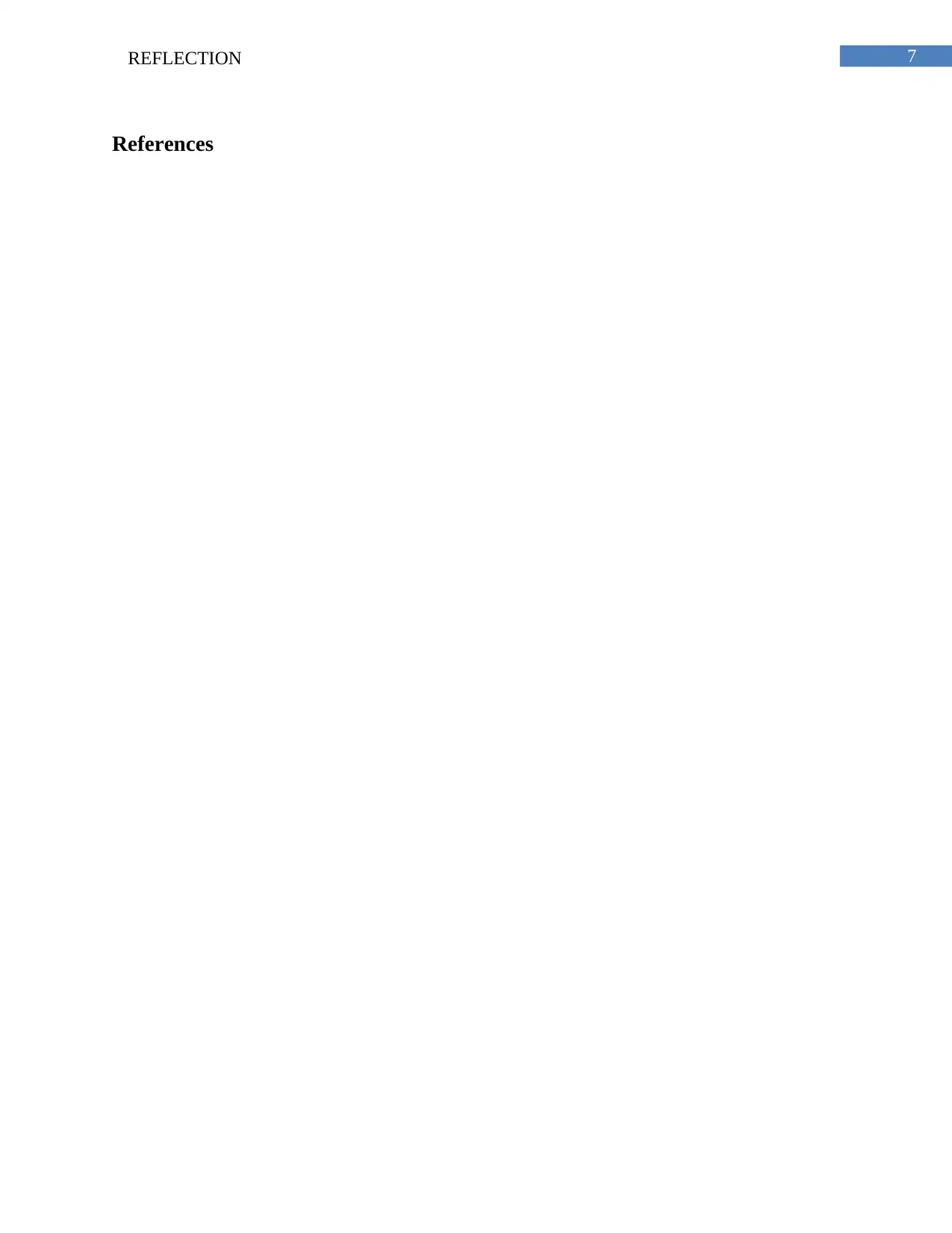
7REFLECTION
References
References
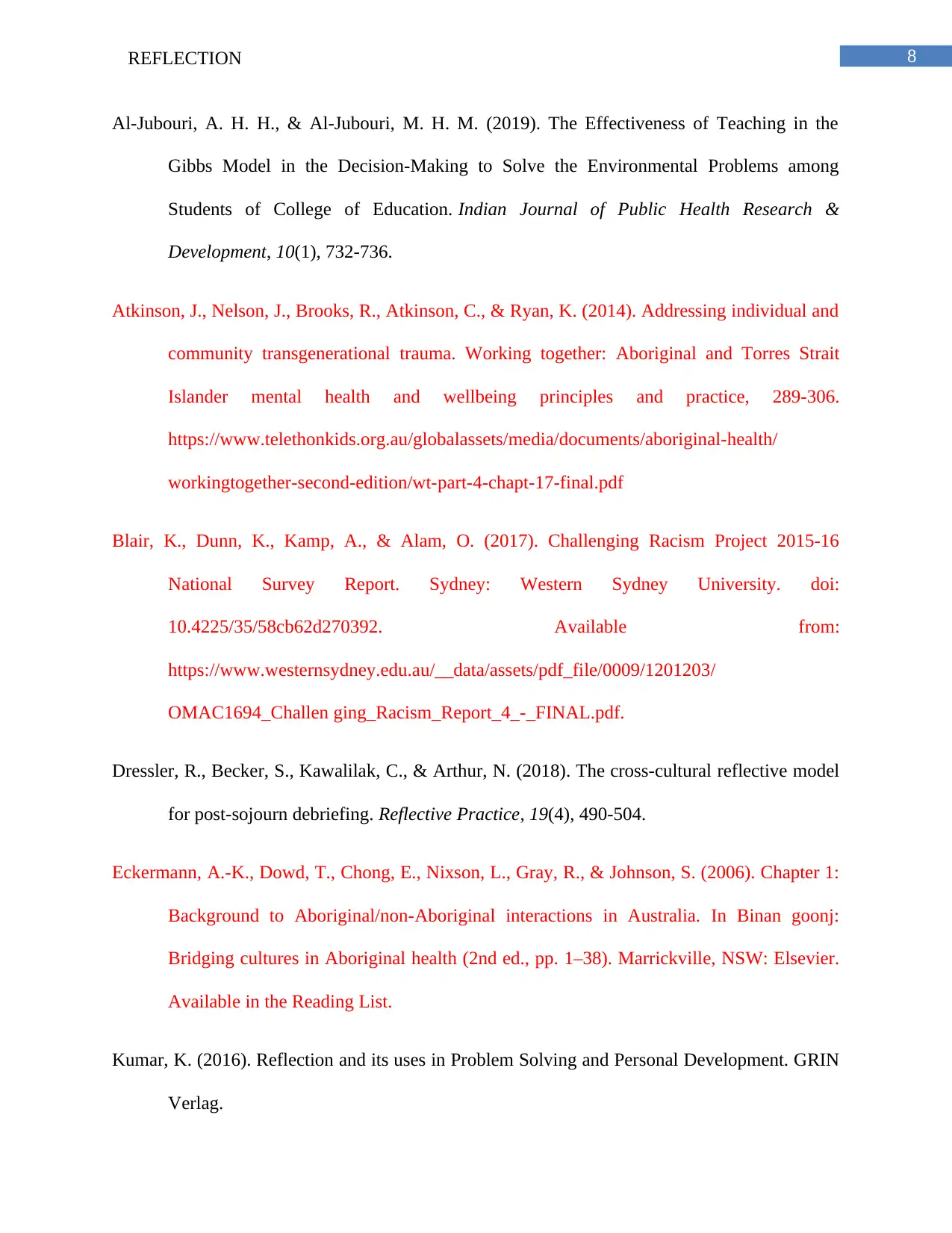
8REFLECTION
Al-Jubouri, A. H. H., & Al-Jubouri, M. H. M. (2019). The Effectiveness of Teaching in the
Gibbs Model in the Decision-Making to Solve the Environmental Problems among
Students of College of Education. Indian Journal of Public Health Research &
Development, 10(1), 732-736.
Atkinson, J., Nelson, J., Brooks, R., Atkinson, C., & Ryan, K. (2014). Addressing individual and
community transgenerational trauma. Working together: Aboriginal and Torres Strait
Islander mental health and wellbeing principles and practice, 289-306.
https://www.telethonkids.org.au/globalassets/media/documents/aboriginal-health/
workingtogether-second-edition/wt-part-4-chapt-17-final.pdf
Blair, K., Dunn, K., Kamp, A., & Alam, O. (2017). Challenging Racism Project 2015-16
National Survey Report. Sydney: Western Sydney University. doi:
10.4225/35/58cb62d270392. Available from:
https://www.westernsydney.edu.au/__data/assets/pdf_file/0009/1201203/
OMAC1694_Challen ging_Racism_Report_4_-_FINAL.pdf.
Dressler, R., Becker, S., Kawalilak, C., & Arthur, N. (2018). The cross-cultural reflective model
for post-sojourn debriefing. Reflective Practice, 19(4), 490-504.
Eckermann, A.-K., Dowd, T., Chong, E., Nixson, L., Gray, R., & Johnson, S. (2006). Chapter 1:
Background to Aboriginal/non-Aboriginal interactions in Australia. In Binan goonj:
Bridging cultures in Aboriginal health (2nd ed., pp. 1–38). Marrickville, NSW: Elsevier.
Available in the Reading List.
Kumar, K. (2016). Reflection and its uses in Problem Solving and Personal Development. GRIN
Verlag.
Al-Jubouri, A. H. H., & Al-Jubouri, M. H. M. (2019). The Effectiveness of Teaching in the
Gibbs Model in the Decision-Making to Solve the Environmental Problems among
Students of College of Education. Indian Journal of Public Health Research &
Development, 10(1), 732-736.
Atkinson, J., Nelson, J., Brooks, R., Atkinson, C., & Ryan, K. (2014). Addressing individual and
community transgenerational trauma. Working together: Aboriginal and Torres Strait
Islander mental health and wellbeing principles and practice, 289-306.
https://www.telethonkids.org.au/globalassets/media/documents/aboriginal-health/
workingtogether-second-edition/wt-part-4-chapt-17-final.pdf
Blair, K., Dunn, K., Kamp, A., & Alam, O. (2017). Challenging Racism Project 2015-16
National Survey Report. Sydney: Western Sydney University. doi:
10.4225/35/58cb62d270392. Available from:
https://www.westernsydney.edu.au/__data/assets/pdf_file/0009/1201203/
OMAC1694_Challen ging_Racism_Report_4_-_FINAL.pdf.
Dressler, R., Becker, S., Kawalilak, C., & Arthur, N. (2018). The cross-cultural reflective model
for post-sojourn debriefing. Reflective Practice, 19(4), 490-504.
Eckermann, A.-K., Dowd, T., Chong, E., Nixson, L., Gray, R., & Johnson, S. (2006). Chapter 1:
Background to Aboriginal/non-Aboriginal interactions in Australia. In Binan goonj:
Bridging cultures in Aboriginal health (2nd ed., pp. 1–38). Marrickville, NSW: Elsevier.
Available in the Reading List.
Kumar, K. (2016). Reflection and its uses in Problem Solving and Personal Development. GRIN
Verlag.
⊘ This is a preview!⊘
Do you want full access?
Subscribe today to unlock all pages.

Trusted by 1+ million students worldwide
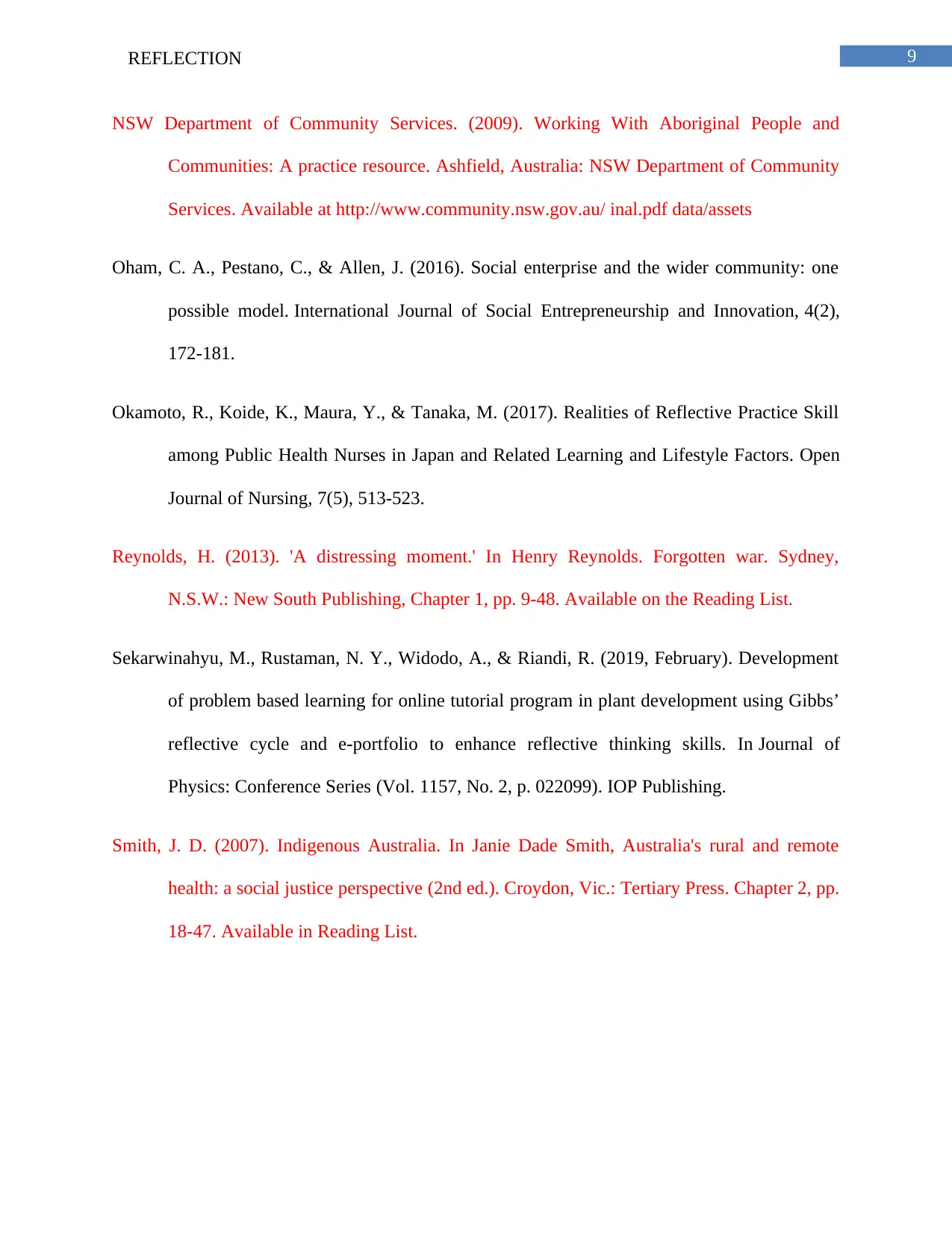
9REFLECTION
NSW Department of Community Services. (2009). Working With Aboriginal People and
Communities: A practice resource. Ashfield, Australia: NSW Department of Community
Services. Available at http://www.community.nsw.gov.au/ inal.pdf data/assets
Oham, C. A., Pestano, C., & Allen, J. (2016). Social enterprise and the wider community: one
possible model. International Journal of Social Entrepreneurship and Innovation, 4(2),
172-181.
Okamoto, R., Koide, K., Maura, Y., & Tanaka, M. (2017). Realities of Reflective Practice Skill
among Public Health Nurses in Japan and Related Learning and Lifestyle Factors. Open
Journal of Nursing, 7(5), 513-523.
Reynolds, H. (2013). 'A distressing moment.' In Henry Reynolds. Forgotten war. Sydney,
N.S.W.: New South Publishing, Chapter 1, pp. 9-48. Available on the Reading List.
Sekarwinahyu, M., Rustaman, N. Y., Widodo, A., & Riandi, R. (2019, February). Development
of problem based learning for online tutorial program in plant development using Gibbs’
reflective cycle and e-portfolio to enhance reflective thinking skills. In Journal of
Physics: Conference Series (Vol. 1157, No. 2, p. 022099). IOP Publishing.
Smith, J. D. (2007). Indigenous Australia. In Janie Dade Smith, Australia's rural and remote
health: a social justice perspective (2nd ed.). Croydon, Vic.: Tertiary Press. Chapter 2, pp.
18-47. Available in Reading List.
NSW Department of Community Services. (2009). Working With Aboriginal People and
Communities: A practice resource. Ashfield, Australia: NSW Department of Community
Services. Available at http://www.community.nsw.gov.au/ inal.pdf data/assets
Oham, C. A., Pestano, C., & Allen, J. (2016). Social enterprise and the wider community: one
possible model. International Journal of Social Entrepreneurship and Innovation, 4(2),
172-181.
Okamoto, R., Koide, K., Maura, Y., & Tanaka, M. (2017). Realities of Reflective Practice Skill
among Public Health Nurses in Japan and Related Learning and Lifestyle Factors. Open
Journal of Nursing, 7(5), 513-523.
Reynolds, H. (2013). 'A distressing moment.' In Henry Reynolds. Forgotten war. Sydney,
N.S.W.: New South Publishing, Chapter 1, pp. 9-48. Available on the Reading List.
Sekarwinahyu, M., Rustaman, N. Y., Widodo, A., & Riandi, R. (2019, February). Development
of problem based learning for online tutorial program in plant development using Gibbs’
reflective cycle and e-portfolio to enhance reflective thinking skills. In Journal of
Physics: Conference Series (Vol. 1157, No. 2, p. 022099). IOP Publishing.
Smith, J. D. (2007). Indigenous Australia. In Janie Dade Smith, Australia's rural and remote
health: a social justice perspective (2nd ed.). Croydon, Vic.: Tertiary Press. Chapter 2, pp.
18-47. Available in Reading List.
1 out of 10
Related Documents
Your All-in-One AI-Powered Toolkit for Academic Success.
+13062052269
info@desklib.com
Available 24*7 on WhatsApp / Email
![[object Object]](/_next/static/media/star-bottom.7253800d.svg)
Unlock your academic potential
Copyright © 2020–2026 A2Z Services. All Rights Reserved. Developed and managed by ZUCOL.





